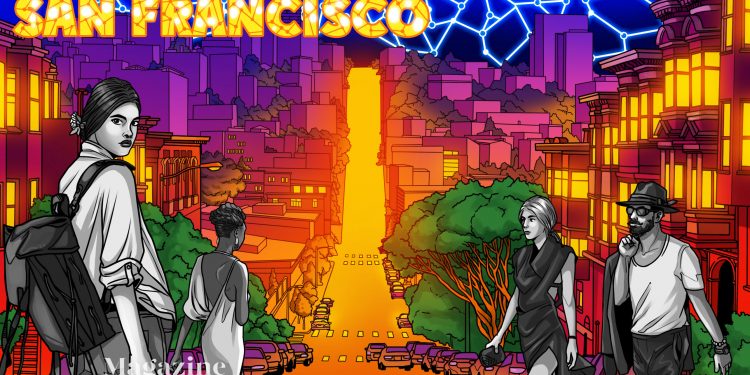This “Crypto City” guide looks at the San Francisco Bay Area’s crypto culture, its most notable projects and people, its financial infrastructure, which retailers accept crypto, and where you can find blockchain education courses. You really might leave your heart in San Francisco with all the projects in the Bay Area.
Fast facts
City: San Francisco
Country: United States
Population: 887,711
Founded: 1776
Language: English

Understand
Though not the most populated part of California or the capital city, the San Francisco Bay Area is well-known for its iconic cable cars, views of the Golden Gate Bridge, and Silicon Valley — both the television series and the real-life tech hub. Originally a Spanish colony and later part of Mexico before becoming a city in the U.S. state of California, many residents live in buildings more than 100 years old.

San Francisco is known for its proximity to the San Andreas Fault, responsible for some of the most devastating earthquakes in U.S. history, including one in 1906 that caused fires that burned down large sections of the city over several days. Another magnitude 6.9 quake hit the Bay Area in 1989, damaging the Bay Bridge between the downtown area and Oakland.
Because many historic buildings and picturesque places have endured despite the earthquakes — and nearby Napa Valley and its wineries may help — San Francisco attracts many tourists from all over the world and has been the filming location for movies too numerous to mention, including The Rock, Mrs. Doubtfire and The Matrix Resurrections. The city also includes the oldest Chinatown in North America, the former military base-turned-park Presidio, Golden Gate Park and the Mission District.
Neighboring cities are separated by the bay but are connected with a network of public transportation. Overall, more than 7 million people live in the area between the wine country in the north and Silicon Valley in the south. The city faces challenges, including one of the country’s largest populations of unhoused individuals, the rising cost of living and other issues common across large urban areas in the United States.
Crypto culture
A tech hub long before the advent of cryptocurrency in 2008, the Bay Area was a natural home for one of the earlier Bitcoin conferences. In San Jose in June 2013, now well-known crypto personalities including Coinbase CEO Brian Armstrong and Bitcoin educator Andreas Antonopoulos spoke to attendees interested in crypto at a time when the space was considered by many to be fringe.
One of the earliest Bitcoin Meetups in the Bay Area happened in January 2013, when organizers Ryan Singer and Jered Kenna — who would go on to co-found Chia Network and become the CEO of the Tradehill exchange, respectively — proposed setting aside the first Tuesday of every month to discuss the crypto asset. Other attendees reportedly included Kraken CEO Jesse Powell, Ripple Labs co-founder Jed McCaleb, Litecoin creator Charlie Lee, and Coinbase’s Fred Ehrsam and Armstrong.
“There were a lot of cypherpunks at those early Bitcoin meetups that I went to,” said Armstrong in a 2021 interview with Initialized Capital founder Garry Tan.
2013: San Jose Bitcoin conference the @coinbase booth was manned just by @brian_armstrong
2021: Coinbase goes public at a $100B market cap pic.twitter.com/wmGyHCb2u5
— Dan Held (In NYC) (@danheld) April 14, 2021
As a predominantly Democratic U.S. state, albeit one containing many conservative voters, California has had its share of lawmakers proposing both pro- and anti-crypto policies as the space evolves. In 2022, the state’s Department of Financial Protection and Innovation issued cease and desist orders against BlockFi, Voyager Digital and Celsius Network related to allegedly offering unregistered securities.
California’s Fair Political Practices Commission also lifted a ban first imposed in 2018, preventing candidates running for state and local offices from accepting donations in crypto. State Senator Sydney Kamlager introduced a bill in February proposing that lawmakers amend the state’s code to allow for the acceptance of cryptocurrencies for certain payments.
Read also
At the state level, Governor Gavin Newsom announced in May 2022 that he had signed an executive order aimed at harmonizing a regulatory framework for blockchain between the U.S. government and California, as well as spurring innovation in the space. The executive action built upon President Joe Biden’s executive order on digital assets signed in March.
CA is the first state in the nation to begin creating a comprehensive & harmonized framework for responsible blockchain technology to thrive.⁰⁰We’re aiming to create a pipeline of talent for the emerging industry & utilize the technology for public good. https://t.co/6Um0lJ9p1y
— Office of the Governor of California (@CAgovernor) May 4, 2022
The state looked as if it would be a battleground to watch in the 2022 midterm elections as pro-crypto candidates attempted to unseat those opposed or neutral about the space. However, both pro-crypto candidates, Democrats Aarika Rhodes and Greg Tanaka failed to win their primaries to represent California’s 30th and 16th Congressional Districts in the U.S. House of Representatives, respectively.
“So many of our elected leaders don’t support or understand technology,” Tanaka told Cointelegraph in April. “They throw rocks in the road in front of it.”
The Bay Area has also hosts San Francisco Blockchain Week, blockchain conference d10e and the Converge22 Web3-focused conference in September.

Projects and companies
One would be hard-pressed to name a major tech firm that didn’t get its start in the Bay Area or Silicon Valley. The area is home to three headquarters out of the big four tech firms, including metaverse-adjacent social media firm Meta, which rebranded from Facebook in October 2021. Social media platform Twitter and blockchain-focused payments firm Block also have their headquarters there, as do PayPal, Visa and Cash App.
In addition, many major cryptocurrency or crypto-adjacent projects likewise began in the tech hub, possibly due to the high density of talent. Coinbase made an early appearance at the San Jose Bitcoin Conference in 2013, where CEO Brian Armstrong personally attended to guests approaching the booth. The Bay Area is also home to the headquarters for Ripple Labs, Chainlink Labs, Robinhood Markets, Compound Labs, decentralized music streaming service Audius, crypto hedge fund manager BitBull Capital, dYdX, Brave Software, Lightning network developer Lightning Labs, Hyperledger Foundation, Andreessen Horowitz, Abra, Earnity, Anchorage Digital, Layer1, crypto and blockchain-focused investment fund Pantera Capital, NuCypher, blockchain ecosystem Rally, Aptos Labs, Scalar Capital, BitGo, Stellar Development Foundation, BlockCypher, Framework Ventures, Securitize, Oasis Labs, Near Protocol, Protocol Labs and CipherTrace as well as local branches of Galaxy Digital, Gemini, Bitfury, Nium, MakerDAO, Solana Labs and crypto miner Crusoe Energy Systems.
20Mission, a co-working space in San Francisco’s Mission District, opened one of the earliest retail stores that accepted Bitcoin in 2015 called Nakamoto’s electronics. Still in use today, the art and technology creator hub was home to many crypto-related startups, including Block-Chain.info, 37Coins, Tradehill, Piper Wallet and Purse.io. Crypto Castle, an office and co-living space that was once home to crypto entrepreneur Jeremy Gardner, was located in the city’s Potrero Hill district and hosted a number of crypto and blockchain projects.
Bitcoin ATMs
In case you were wondering what a #Bitcoin ATM looks like, here’s a peek of the one at @hackerdojo. pic.twitter.com/eeiBf8C9VB
— Mountain View Voice (@mvvoice) March 29, 2014
Financial infrastructure
In March 2014, a community tech center named Hacker Dojo installed the first Bitcoin ATM in the San Francisco Bay Area in Mountain View. The installation of the ATM, operated by Robocoin, was followed by another at the Workshop Cafe of San Francisco’s Financial District later that year. According to data from CoinATMRadar, there are roughly 469 crypto ATMs in the San Francisco Bay Area, operated by companies, such as Coin Cloud, CoinFlip and Bitcoin Depot.
Where can I spend crypto?
Crypto as a medium of exchange hasn’t reached mainstream levels of adoption in the U.S., but there are more than 100 businesses in San Francisco that accept Bitcoin and other tokens for payments according to Coinmap. These include restaurants, bookstores and even optometrists’ offices.
Across the Bay Area, retailers including Starbucks, Whole Foods and others accept crypto payments through third-party apps. In addition, residents and workers in Silicon Valley can spend their crypto at more than 50 businesses in the area. Though seemingly offering only payments in fiat and through third-party apps, Meta opened a brick-and-mortar retail store in Burlingame in May, which offers hardware for its metaverse ambitions.
Read also
Education
San Francisco State University offers a “blockchain bootcamp” through its Lam Family College of Business and recently collaborated with Ripple Labs and the Warsaw University of Technology to allow students to develop blockchain-based solutions to projects, including supply chain tracing and the commercialization of artwork.
Across the Bay, the University of California, Berkeley currently has a student-run blockchain innovation hub for consulting, education and research. Stanford’s Center for Blockchain Research held its fifth blockchain conference in August 2022. The Palo Alto-based university offers courses on blockchain and cryptocurrency through its School of Engineering for the autumn semester, while in the city, the University of San Francisco lets students learn about blockchain through its College of Arts and Sciences.
“The potential application for Bitcoin-like technologies is enormous,” says the Stanford course description.

Controversies and collapses
In 2013, authorities arrested Ross Ulbricht, creator of the infamous darknet marketplace Silk Road, at a San Francisco Public Library. Federal Bureau of Investigation specialist Christopher Tarbell led the team, which tracked down Ulbricht using VPN server records corresponding to an internet cafe in the city where he had also logged into his Gmail account. The information ultimately led to the arrest of the “Dread Pirate Roberts” and the eventual end of Silk Road. Ulbricht is currently serving two life sentences without the possibility of parole.
Though not forced to shut down by excessive regulations or orders from law enforcement, crypto exchange Kraken unexpectedly shuttered its San Francisco office in April 2022. CEO Jesse Powell said the company’s headquarters on Market Street was closed following complaints that “numerous employees were attacked, harassed and robbed on their way to and from the office.” Coinbase also announced plans to shut down its San Francisco headquarters in 2022, but as part of an effort to go remote rather than due to threats while commuting.
Subscribe
The most engaging reads in blockchain. Delivered once a
week.

Notable figures in the San Francisco Bay Area
Bitcoin core developer and Blockstream co-founder Pieter Wuille; Meta CEO Mark Zuckerberg; Solana co-founder Anatoly Yakovenko; Audius CEO and co-founder Roneil Rumburg; BitBull Capital CEO Joe DiPasquale; Pantera Capital head of investor relations Kerry Wong; Pantera CEO and Bitstamp chair Dan Morehead; Robinhood co-founder Vlad Tenev; Ripple Labs chief technical officer David Schwartz; Ripple CEO Brad Garlinghouse; Ripple co-founder Chris Larsen; Coinbase chief operating officer and president Emilie Choi; Framework Ventures co-founder Michael Anderson; Crypto Council for Innovation CEO Sheila Warren; Rally co-founder Kevin Chou; Coinbase co-founder and Paradigm co-founder Fred Ehrsam; Brave Software CEO Brendan Eich; Scalar Capital co-founder and managing director Linda Xie; Earnity co-founder and CEO Dan Schatt; Coinbase board member Kathryn Haun; former Twitter CEO and current “Block Head” Jack Dorsey; dYdX founder and CEO Antonio Juliano; BitGo CEO Mike Belshe; Andreessen Horowitz co-founder Marc Andreessen; Oasis Labs co-founder and CEO Dawn Song; Compound Labs founder Robert Leshner; Protocol Labs founder and CEO Juan Benet; PayPal co-founder and crypto investor Peter Thiel; Ripple Labs and Stellar Development Foundation co-founder Jed McCaleb; Stellar Development Foundation CEO Denelle Dixon; crypto and tech investor Tim Draper; Visa head of crypto Cuy Sheffield; Abra founder and CEO Bill Barhydt; CipherTrade CEO David Jevans; former Tradehill CEO and current CEO of 20Mission Jered Kenna; Cointelegraph team members: Rachel Wolfson.
The entire @Ripple C++ team is in San Francisco. Here’s @JoelKatz, along with some new $XRP swag. pic.twitter.com/eMxlPkEzwT
— ? ? ? ? (@nbougalis) December 13, 2017
If you have any suggestions for additions to this guide, please contact turner@cointelegraph.com.
Read also


